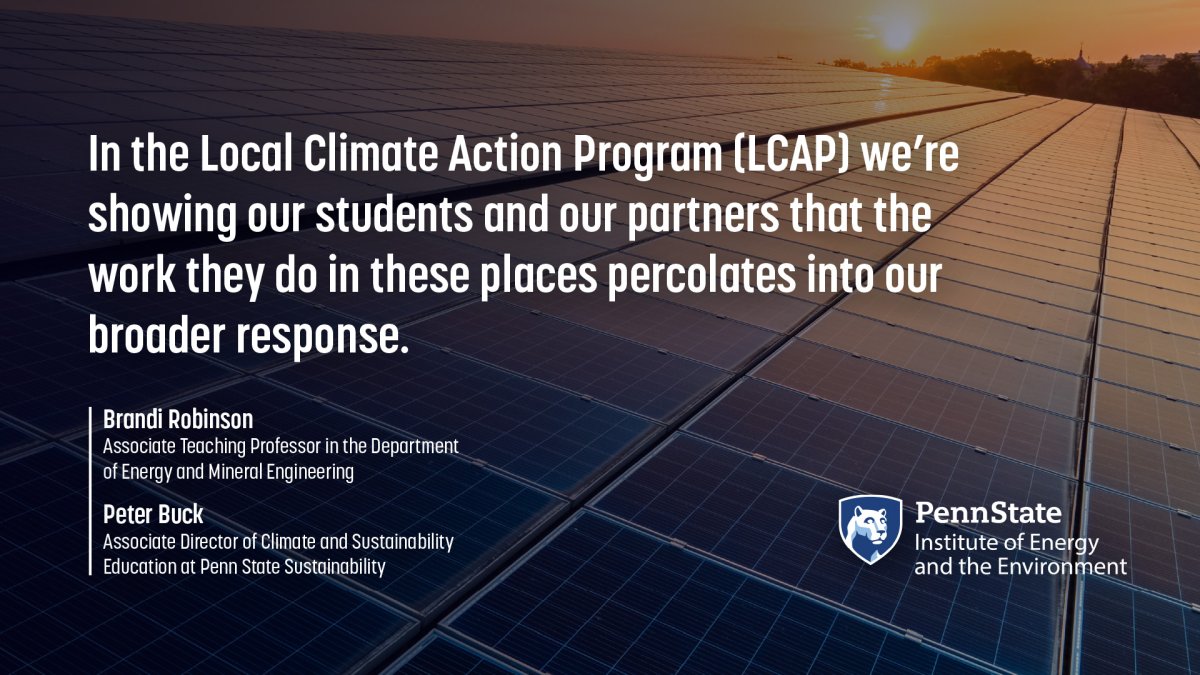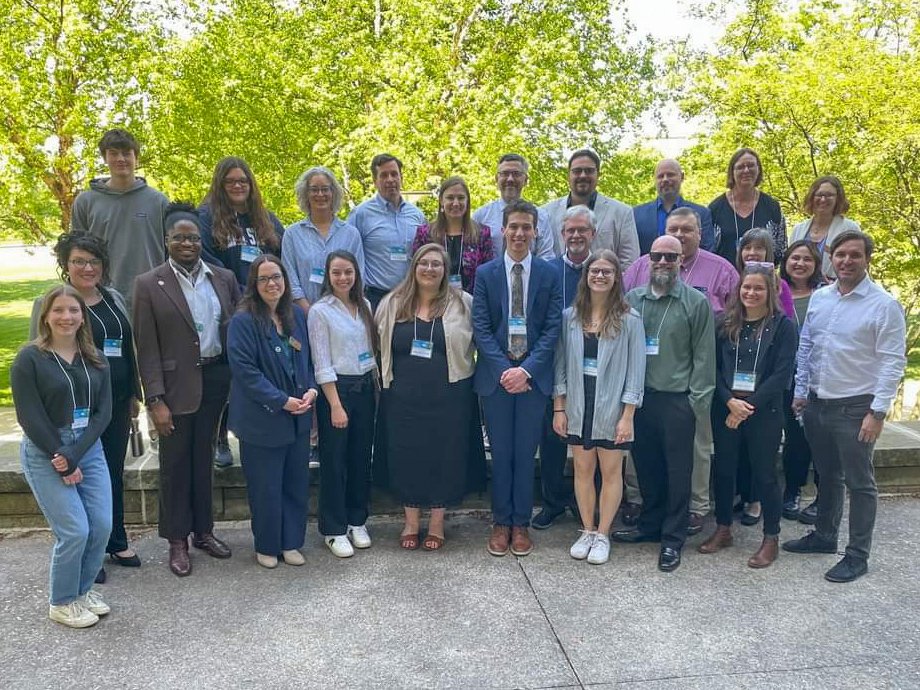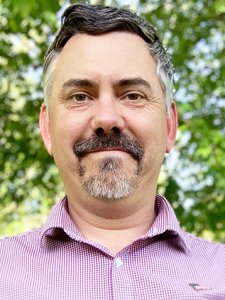We often hear about the global climate crisis with metrics like atmospheric concentration of carbon dioxide or changes to global average temperature. And while those numbers can be sobering, they can also be hard to relate to for most of us. Thinking about a global problem can make it abstract, amorphous, and overwhelming. We hear about things that are far away or off in the future. It can feel like climate change is everywhere which is kind of like it being nowhere. If it is distant and all around us, what are we even supposed to do about it?
But it isn’t far off. Its causes and its consequences are right here, right now. Pennsylvania stands in the top five in the United States for greenhouse gas emissions because of our large industrial, energy generation, and fossil fuel production, transportation, and agricultural sectors. We have also been on the receiving end of heat waves that shut down Philadelphia schools, Canadian wildfire smoke that led to some of the worst air quality in the U.S. in Harrisburg, flash flood events that killed people in Bucks County and the Lehigh Valley, and led to protracted humidity, rain, and mold outbreaks that nearly delayed a State College elementary school from opening. Each of those climate drivers and impacts is happening in a place. Community climate action is where it’s at.

Penn State Sustainability, in partnership with the John and Willie Leone Family Department of Energy and Mineral Engineering, the Department of Environmental Protection’s Energy Programs Office, and International Council for Local Environmental Initiatives (ICLEI) Local Governments for Sustainability administers the Local Climate Action Program (LCAP). Over the course of two academic semesters, we (Brandi Robinson and Peter Buck) bring together Penn State students (students from every campus, including the World Campus, are welcome to participate) and local government officials and representatives to inventory community emissions and develop and implement local-scale climate policies.
Communities volunteer to be part of this program, largely because they understand the urgency of climate change and experience its impacts firsthand. Despite that front-row seat to the causes and consequences of a changing climate, many local governments lack the capacity to respond and adapt. The LCAP builds this capacity in providing support to begin this important climate policy planning work. Now in our third year, we have worked with over thirty partners: townships like Uwchlan in Chester County, boroughs like Homestead outside of Pittsburgh, a Council of Governments in the Centre Region, the Commonwealth’s third largest city Allentown, Bucks County that has a population nearly the size of Wyoming, and the Department of Conservation and Natural Resources that manages over 20 state forests, more than 120 parks, and thousands of vehicles and facilities.

We teach our students climate policy and science from the global to the local. They come to understand the structure of the United Nations Sustainable Development Goals (SDGs) and the Paris Agreement and scale impacts, drivers, policies, and projects through the United States Nationally Determined Contribution. Drilling down from the national level, they learn about Pennsylvania’s Climate Action Plan, and individual local plans like the Centre Region’s Climate Action and Adaptation Plan, net-zero resolutions, and more. Situating their learning from the framework of nested geographic scales reinforces the fact that effective solutions at every scale of governance are needed to address the climate crisis. In LCAP, we’re showing our students and our partners that the work they do in these places percolates into our broader response.
Students use ICLEI’s industry-standard software, ClearPath, and utility and other data to generate an inventory report. They assess electricity and natural gas use in residential, commercial, and industrial facilities. They calculate emissions from on- and off-road transportation. Solid waste, wastewater, water, fugitive emissions, agriculture, and other sources are included. Having built up a working relationship with their government partner, they then deliver the inventory in a written report and in a public meeting of the board of commissioners or supervisors, environmental advisory committee, or a special mayor’s or economic development committee. The inventory provides the technical basis and evidence for planning and future action.

In the second semester, we embark on what we’ve come to call a “Choose Your Own Climate Policy Adventure,” allowing our community partners to drive the direction our work takes. For some communities, particularly smaller townships, and boroughs like Doylestown in Bucks County, we pull together a climate action. In Homestead, we provided a plan framework centered on the Borough’s participation in the Sustainable Pennsylvania program, guiding them toward actions that would build on previous accomplishments. In Lower Merion Township, students ran emissions forecasting scenarios that guided their Sustainability Plan. In Uwchlan, we reviewed their zoning to see whether and how it could inhibit residential and commercial solar energy development. In Lower Macungie, our student assessed potential land developments and open space preservation investments for carbon emissions and carbon sinks. We know our previous partners are continuing this work, with DCNR organizing themselves for infrastructure investments while Mechanicsburg is including climate actions in their new Comprehensive Plan.

The LCAP combines education and workforce development with technical assistance that builds capacity at the same time. It provides rich experiential learning for students. With the community and the climate as the “classroom,” our students are immersed in climate work with immediate real-world application. Because their audience for the class is always their community partner and they have to build the relationship with that partner, they are developing communication, organizational, team-building, and technical skills together. They are becoming the climate workforce. Finally, because we offer our community partners access to all our materials and trainings, we build their capacity as well. For some of them, the LCAP provides an immediate and long-term boost. No matter how we look at it, the LCAP’s work has a life well beyond a course platform’s dropbox.
In the anchor chapter of Teaching Climate Change in the United States, we wrote the following with Dr. Michael E. Mann:
Given the scale and pace of the climate crisis,... [climate change educators] must connect our knowledge to shared values of justice, community, and well-being, and work together. In a democracy, those who understand what is at stake ought to use their knowledge and expertise to develop understanding, build will, prompt action, and see that it is achieved.
That is exactly what the LCAP has done. We serve people and the communities they love. We use science to the best of our ability to make it relevant to our communities. And we bring an unwavering dedication to the democratic process and the fair treatment and equal involvement of all people together. We show up together. By doing that, we build hope in action.
Brandi Robinson is an assistant teaching professor for the Energy and Sustainability Policy bachelor’s program as well as the Renewable Energy and Sustainability Systems master's program. She brings expertise in policy formation and analysis relative to carbon markets to her teaching, as well as local-scale greenhouse gas inventorying and mitigation strategy development. Her research focuses on the efficacy of utilizing local policy mechanisms and structures of governance to address issues surrounding global change.
Peter Buck catalyzes, communicates, and connects people for sustainability. Currently, he serves as a primary resource to assist two structural endeavors: the creation of a Program for Sustainability in the Interdisciplinary Schools (to open in Fall 2025) and the development of Penn State’s Sustainability Learning Outcomes. Peter supports these institutional goals through the Roe Fund for a Just and Sustainable Future, the Penn’s Woods Workshops, as well as consulting and teaching in first-year seminars, advanced climate dynamics, sustainable architecture, and beyond.





